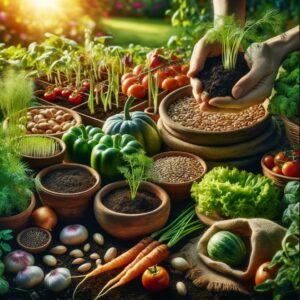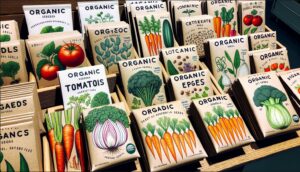Organic Vegetable Seeds: Your Ultimate Guide to Sustainable Gardening
Organic Vegetable Seeds: Your Ultimate Guide to Sustainable Gardening
Introduction to Organic Vegetable Seeds
In the world of gardening, the choice of seeds is where the journey to cultivation begins. Organic vegetable seeds are not just a choice; they’re a statement of health, environmental consciousness, and sustainability. But what exactly are organic vegetable seeds, and why are they gaining such popularity among gardeners and farmers alike?
Organic vegetable seeds are produced without the use of synthetic pesticides, fertilizers, or genetically modified organisms. They are the cornerstone of organic gardening, ensuring that the food you grow is not only nutritious but also free of harmful chemicals. In this guide, we’ll explore the myriad benefits of using organic seeds, from their environmental impact to the health advantages they offer.
Choosing organic seeds is the first step toward a more sustainable and eco-friendly garden. Whether you’re a seasoned gardener or just starting, understanding the importance of these seeds is crucial for anyone looking to make a positive impact through their gardening practices. Join us as we delve into the world of organic vegetable seeds, providing you with the knowledge and tips you need to cultivate a thriving, sustainable garden.
Organic gardening is more than a hobby; it’s a commitment to fostering a healthier environment and lifestyle. At the heart of this practice lie organic vegetable seeds, the unsung heroes that set the foundation for sustainable agriculture. These seeds, devoid of synthetic chemicals and genetic modifications, offer gardeners the purest start to their gardening journey.

Why Choose Organic Seeds?
Choosing organic seeds is a vote for environmental health and biodiversity. These seeds are bred in organic settings, which enhances their ability to thrive without chemical assistance. This resilience translates to robust plants that can better resist pests and diseases, reducing the need for synthetic pesticides and fertilizers.
Genetic Diversity and Adaptation
Organic seeds often come from plants that have been grown in diverse and challenging environments. This exposure leads to the development of robust genetic traits, enabling the seeds to adapt to various conditions. By choosing organic, gardeners can cultivate a garden that’s not only productive but also resilient to climate fluctuations and local pests.
The Health Perspective
From a health standpoint, organic seeds are a cornerstone of a toxin-free diet. By starting with seeds that haven’t been treated with harmful chemicals, you ensure that the vegetables you grow and consume are as healthy as possible. This is especially crucial for those who grow food for young children or family members with health concerns.
Supporting Sustainable Practices
When you purchase organic vegetable seeds, you’re supporting a system that values soil health, biodiversity, and ecological balance. Organic farming practices are designed to maintain soil fertility and reduce pollution, ensuring that the land will remain arable and productive for future generations.
A Cost-Effective Choice
Investing in organic seeds can also be seen as a cost-effective gardening choice. Although the initial price might be slightly higher than conventional seeds, the long-term savings are significant. Organic plants are generally more vigorous and require fewer inputs in terms of pest and disease control, which can reduce gardening costs over time.
In the following sections, we’ll delve deeper into the benefits of using organic vegetable seeds, offer guidance on selecting the right seeds for your garden, and share expert tips on cultivating a bountiful and sustainable garden.
Benefits of Using Organic Seeds
How to Choose the Right Organic Vegetable Seeds
Selecting the right seeds is a critical step in the journey of organic gardening. Here are some key factors to consider when choosing organic vegetable seeds:
- Climate Compatibility: Not all seeds thrive in the same conditions. Consider your local climate, including temperature ranges and season length, when selecting seeds. Opt for varieties known to perform well in your region’s specific conditions.
- Seed Source: Purchase your seeds from reputable organic seed suppliers. Look for certifications to ensure the seeds are genuinely organic. Trusted suppliers often provide detailed information about the seed’s origin, growing conditions, and organic certification.
- Planting Goals: Define what you want from your garden. Are you focusing on yield, flavor, or perhaps diversity? Choose seeds that align with your goals. For instance, if space is limited, look for compact or dwarf varieties.
- Disease Resistance: Opt for seed varieties with built-in resistance to common pests and diseases in your area. This can lead to a more successful harvest with less need for intervention.
- Heirloom vs. Hybrid: Heirloom seeds are open-pollinated and have been passed down through generations, offering unique flavors and varieties. Hybrids are crossbred for specific traits like disease resistance or uniformity. Decide which type aligns with your gardening philosophy and goals.
- Germination Rate: Check the seed packet for the germination rate, which indicates the percentage of seeds expected to successfully sprout. Higher germination rates can lead to more successful plantings.
By carefully selecting your organic vegetable seeds, you set the stage for a garden that aligns with your environmental values, dietary preferences, and gardening ambitions. In the next section, we’ll explore innovative methods to start your seeds using LED lights and hydroponics, maximizing your garden’s potential from the very beginning.

Starting Seeds Indoors: LED Lights and Hydroponics
Embarking on your organic gardening journey can be exciting, especially when you incorporate modern techniques like using LED lights and hydroponic systems. These methods can optimize your seed starting process, ensuring strong and healthy plant growth from the outset.
- Why Use LED Lights?: LED lights provide a consistent light source essential for seedlings, especially in regions with limited natural sunlight. They’re energy-efficient, emit less heat, and can be customized to provide the optimal light spectrum for plant growth, ensuring your seedlings develop strong roots and sturdy stems.
- Setting Up Your LED Grow Lights: Position your LED lights about 2-4 inches above the seed trays, adjusting the height as the plants grow. Ensure the lights are on for 14-16 hours a day to mimic natural sunlight. Using a timer can help maintain a consistent light cycle.
- Introduction to Hydroponics: Hydroponic systems allow you to grow plants in a water-based, nutrient-rich solution, without soil. This method can lead to faster growth rates and higher yields, making it an excellent option for organic vegetable seed starting.
- Hydroponic Seed Starting: Begin with a simple hydroponic setup like a deep water culture or a wick system. Use rockwool cubes or peat moss as a growing medium for your seeds. Once the seeds germinate and seedlings develop, ensure they receive the right nutrients by adding an organic hydroponic nutrient solution to the water.
- Advantages of Hydroponics: This soil-less growing method reduces the risk of soil-borne diseases and pests. It also allows for better control over the plant’s environment, ensuring optimal growth conditions. Additionally, hydroponics can be a space-saving solution, perfect for urban gardeners or those with limited outdoor space.
Combining LED lighting with hydroponic systems can revolutionize the way you start your organic vegetable seeds, leading to robust plant growth and a successful gardening season. In the next section, we’ll cover the best practices for planting and caring for your organic seeds, ensuring a fruitful harvest.
Planting and Caring for Your Organic Seeds
Properly planting and caring for your organic seeds is crucial for developing a thriving, productive garden. Here are some essential tips to guide you through this process:
- Soil Preparation: Start with rich, well-draining soil, ideally enhanced with organic compost. The soil should be loose and fertile to allow for proper root growth and water retention. Ensure the pH level is suitable for the vegetables you plan to grow.
- Seed Planting: Follow the planting instructions on the seed packet, as depth and spacing can vary significantly between different vegetable types. Generally, seeds should be planted at a depth of about two to three times their diameter.
- Watering: Keep the soil consistently moist but not waterlogged. Overwatering can lead to root rot and other issues, while under-watering can stress the plants, affecting their growth and yield.
- Temperature and Light: Ensure your garden or seed-starting area maintains an appropriate temperature for the seeds to germinate. Most vegetables require a warm environment to sprout. Once they emerge, provide ample sunlight or supplement with grow lights for strong, healthy growth.
- Thinning: Once the seedlings have a few true leaves, thin them out to prevent overcrowding. This ensures that the remaining plants have enough space, nutrients, and light to grow.
- Nutrition: Feed your plants with organic fertilizers, but be cautious not to over-fertilize. Too much fertilizer can harm your plants and the environment. Choose a balanced, slow-release organic fertilizer that provides essential nutrients throughout the growing season.
- Pest and Disease Management: Monitor your plants regularly for signs of pests or diseases. Use organic methods to control any issues, such as introducing beneficial insects, applying neem oil, or using homemade remedies.
- Support and Training: Some plants, like tomatoes and climbing beans, may require support as they grow. Use stakes, trellises, or cages to support these plants and promote healthy growth.
By providing the right care and attention, your organic vegetable seeds will develop into strong, healthy plants, yielding a bountiful and nutritious harvest. Embrace the journey of watching your seeds grow and enjoy the fruits (and vegetables) of your labor!
Beyond the Garden: The Broader Impact of Choosing Organic
Choosing organic vegetable seeds extends its benefits far beyond the boundaries of your garden. It’s a decision that positively impacts the environment, supports sustainable agriculture, and promotes a healthier lifestyle. Here’s how making this choice contributes to a larger good:
- Environmental Conservation: By choosing organic seeds, you’re supporting agricultural practices that reduce pollution and conserve water. Organic farming minimizes soil erosion and encourages biodiversity, helping to maintain healthy ecosystems.
- Promoting Biodiversity: Organic seeds often come from heirloom varieties, which helps preserve genetic diversity in the plant kingdom. This diversity is crucial for resilience to pests, diseases, and changing climate conditions.
- Supporting Local Economies: Purchasing organic seeds from local producers or companies committed to sustainable practices supports the local economy and promotes the organic agriculture industry, creating more opportunities for farmers to adopt eco-friendly practices.
- Health and Wellness: Growing your vegetables from organic seeds ensures that your food is free from synthetic chemicals and GMOs, contributing to better health and well-being for you, your family, and your community.
- Educational Value: Your organic garden can serve as a living classroom, educating others about the importance of sustainability and the impact of our choices on the environment. It’s a tangible way to demonstrate the principles of ecology and conservation.
By choosing organic vegetable seeds, you’re not just growing a garden; you’re nurturing a healthier planet and community. It’s a simple yet profound way to make a difference, one seed at a time.
